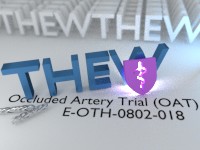
- The Victor Chang Cardiac Research Institute (VCCRI), Sydney, Australia
- The College of Veterinary Medicine, Cornell University, Ithaca, NY, USA
- The Massachusetts General Hospital, Harvard Medical School , Charlestown, MA, USA
-The National Polytechnic Institute, Mexico City, Mexico
-Cardio-QT Ltd. Glasgow , UK
-Chung-Yuan Christian University, Taiwan, China
Learn more about our members: here
New THEW publications:
1-Pickham D et al. Time dependent history improves QT interval estimation in atrial fibrillation.J Electrocardiol, 2012 Nov; 45(6):556-60.
2- Tereshchenko LG et al., Predictive value of beat-to-beat variability index across the continuum of left ventricular dysfunction: Competing risks of non-cardiac or cardiovascular death, and sudden or non-sudden cardiac death, Circulation Arrhythmia and Electrophysiology 2012, Online ISSN:1941-3084.
3- Halamek J at al. Step Responses of Electrical and Mechanical Heart Activity. Presentation at the IEEE-EMBC'12,San Diego, California
4- Couderc JP et al. Instantaneous Response of QT to RR Changes Identifies an Impairment of Repolarization Adaptation to Heart Rate in the LQT-1 Syndrome.J Am Heart Assoc. 2012; doi: 10.1161/JAHA.112.000570.
5- Jacquemet et al. Assessment of the sensitivity of detecting drug-induced QTc changes using subject-specific rate correction. ISCE, 2012 .
6-Couderc JP et al. The Telemetric and Holter ECG Warehouse (THEW): The first three years of development and research. J Electocardiol., 2012,677-683.
7- Guldenring D. et al. Estimation performance of a reduced lead system during continuous 12-lead ECG ST-segment monitoring. J Electocardiol., 2012,604-608
8- Hasan MA, et al. Beat-to-Beat Vectorcardiographic Analysis of Ventricular Depolarization and Repolarization in Myocardial Infarction.PLoS One. 2012;7(11):e49489. doi: 10.1371
 |
Keep updated about our initiative. Register to our LinkedIn group - 514 registered members. |
|

| NEW THEW DATABASE announcement: The OCCLUDED ARTERY TRIAL from the New-York School of Medicine, NY, USA. |
| We are pleased to announce a new ECG database available to the THEW members, it is the second database from a large NIH-funded clinical trial: the Occluded Artery Trial (OAT). |
This new database (E-OTH-03-0802-018) hosts the 20-minute ECGs recorded during the trial designed to determine whether opening an occluded infarcted artery (percutaneous coronary intervention: PCI) 3-28 days after an acute myocardial infarction in high-risk asymptomatic patients reduces the composite endpoint of mortality, recurrent myocardial infarction, and hospitalization for class IV congestive heart failure over a three year follow-up. |

|
The trial was conducted as a randomized study involving 2166 stable patients who had total occlusion of the infarct-related artery 3 to 28 days after myocardial infarction and who met a high-risk criterion (an ejection fraction of <50% or proximal occlusion).
Of these patients, 1082 were assigned to routine PCI and stenting with optimal medical therapy, and 1084 were assigned to optimal medical therapy alone. The trial demonstrated that PCI did not reduce the occurrence of death, reinfarction, or heart failure. Furthermore, there was a trend toward excess reinfarction during 4 years of follow-up in stable patients with occlusion of the infarct-related artery 3 to 28 days after myocardial infarction.
Shared by the New York School of Medicine and SUNY, this new database includes 802 ~20-minute ECG recordings from a subset of 302 patients enrolled in the OAT trial (3.6 Holter recordings per patient in average). The access to this database requires THEW members to submit a short research proposal that will be reviewed by an ad-hoc committee consisting of the principal investigators of the OAT trial and its Holter-related substudy (i.e. Prof. Judith Hochman, MD from the NYU Langone Medical Center and Prof. Eric Rashba from Stony Brooke University of Medicine). In addition to the ECG recordings, this new database includes a large set of clinical information which is described here.
Also, we announce a brand new THEW website redesigned to facilitate access to the most popular pages. These pages include a descriptive list of the THEW databases, a description of the standard ECG file format used in the THEW, and the growing list of publications based on the data shared with private and public organizations world-wide. Finaly, we introduce a library of MATLAB and C++ codes freely available to download from the website. It contains procedures to access the data from the THEW SFTP within MATLAB to directly read and decode the ECG file format and annotation file format from the MATLAB platform. |
| THEW DATABASE UPDATE: The Congenital LQTS database now includes manually-adjudicated beat annotation. |

|
The THEW LQTS database contains 480 Holter recordings from genotyped patients with the congenital long QT syndrome (LQTS). The database has been recently updated with new annotation files that are full manual adjudication of the 24-hour recordings by expert ECG technicians. This database has been one of the most distributed datasets of the THEW repository. |
It contains the patient genetic information and information about patients' cardiac events before or after the time of the Holter recording. More information about the database is provided in the database webpage: E-HOL-03-0480-013 |
THEW NEW WEBSITE click to visit the website. |
| Visit the new THEW website which has been entirely reformatted in order to provide easier access to the most visited pages of the site during the past three years. In addition to its new look, the website also contains new pages including a public library of MATLAB and C++ codes, an interactive list of members, and quick links to database listing, THEW publications and technical support. |
![website]](http://www.thew-project.org/images/THEWebsiteexample.jpg) |
| |
| TECHNICAL CORNER: The THEW SFTP Toolbox for MATLAB and C++ is released |
by D. Guldenring, School of Computing and Mathematics, University of Ulster, Belfast, United Kingdom |
What is the THEW SFTP Toolbox for MATLAB?
The ECG data that is hosted by the THEW secured FTP (SFTP) server is stored in the ISHNE file format. The THEW SFTP Toolbox provides a set of user-friendly MATLAB functions that allow direct access to the ECGs and annotation files that are hosted on the THEW SFTP server.
How to use the THEW SFTP Toolbox for MATLAB?
The Toolbox can be utilized through the six MATLAB functions that are detailed below.
| Data reading procedures |
| sFtpRead_ishne |
used to read ECG data) |
| sFtpRead_binAnn |
used to read annotation files |
| Retrieval of the SFTP server file structure |
| sFtpLs |
returns a list of the content of a SFTP server directory |
| Management of connection with THEW SFTP server |
| sFtpConnect |
(opens a connection to the THEW SFTP server) |
| sFtpDisconnect |
closes the connection to the THEW SFTP server |
| Add the THEW SFTP Toolbox to MATLAB |
| sFtpAddDynPath |
adds Toolbox to the Java class path of MATLAB |
Installation
The file “sFtpThew.zip” that contains the THEW SFTP Toolbox can be downloaded from here. The THEW SFTP Toolbox does not require the installation of any additional software (other than MATLAB). The folder “sFtpThew” that is contained in the ZIP file can be stored anywhere on your computer. The sFtpThew folder contains the MATLAB script “sFtpThewExample.m”. This script illustrates how the THEW SFTP Toolbox can be used to read ECG data and annotations from the server. Before this script can be executed, the access details (username and password) for the THEW database have to be filled into the appropriate location in the “sFtpThewExample.m” script. After that, the script can be used to read files of subscribed databases.
Supported MATLAB versions and implementation internals
The main functionality for accessing the SFTP server of the THEW SFTP Toolbox is implemented through a Java library that is contained in the Java archive “sFtpThew.jar“. This library was compiled to be compatible with a Java Virtual Machine (JVM) supporting Java 1.4 or later. Adequate JVMs are provided by MATLAB versions (R14, 2004) and later. The THEW SFTP Toolbox should therefore work for MATLAB (R14, 2004) and later versions. The toolbox has been successfully tested with MATLAB (R2009a) and MATLAB (R14, 2004) for Windows and for MATLAB (R2009a) Mac OS.
To obtain a version of these codes please visit this page. |
|




![website]](http://www.thew-project.org/images/THEWebsiteexample.jpg)